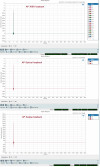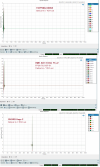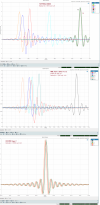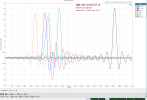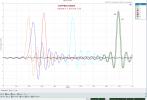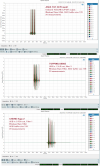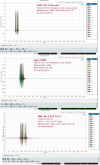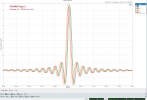Out of curiosity, have you measured your reaction times? I’m sure I’ve seen apps for that somewhere…
I’ve seen a figure attributed to an nvidia study of 150ms for a talented (fast) gamer.
Yes, I did measure my reaction times to
visual stimulus a number of years ago, I think it was around 200ms. I haven't measured my reaction time to
auditory stimulus but it should be lower than visual, as our brains are wired to react faster to auditory. That's not really the point though, the point is that every ms of latency that is added onto the audio stimulus by the DAC then that is added onto your overall reaction time. Examples of the difference this makes in any multiplayer shooter - if someone starts shooting at you then you hear it, you then spin round immediately to where the sound is coming from and shoot back - if you're too slow and he's too accurate then you're dead, so each additional ms of latency can mean the difference between the game server deciding that you're dead or that you're alive based on both of the players actions. Other examples, in BF1 (which I used to play a lot and still a fair bit), if I hear someone shooting at me and I'm in the middle of reloading then evasive action is the only way to survive so I might immediately change direction and slide & dive behind any immediate cover, or just some plain old unpredictable random movements to evade the aim of the incoming bullets - but that is all stuff that I'd do instinctively and pretty much immediately and without conscious thinking the moment I get such an auditory cue.
I have zero experience in gaming, but I am genuinely interested in what you mean exactly. Can you give a concrete exemple where hearing a sound event a few milisecond too late would make you die? I mean, once you hear a gunshot aimed at you, you're already dead anyway right, there's nothing you can react to once the shot is triggered? You mean reacting to the sound of someone coming out of the bushes behind you or something? Is this really what trigger a reaction from you in gaming or is it what you see on the screen? Perceptively they will happen at the same exact time, I have a hard time understanding. On the other way, if it's your own shot, I would assume it doesn't matter when you hear it. The game registered your action, it will never be based on when the sound come out of your headphones. Maybe something I just don't get. Now, about your screen 240 Hz refresh rate. I am not familiar with that neither but does the game actually generate 240 distinct frames per seconds? I would doubt so but willing to be educated. I would assume it's just some algorithm to maximise fluidity but maybe it's a new standard specific to gaming.
Hi, I answered your questions in my reply to dc655321 above, but to add some further stuff that hasn't been covered. These auditory cues can come from behind, so you'd be reacting to stuff that is not in your field of vision. Well also you'd react in the same way if it was also in your field of vision, quite often you won't see an enemy player if he's under cover, but you would hear his gunshots at you, which emphasises where to look for the muzzle flash & tracers. You also get strong auditory cues for when you're actually being struck by bullets which again gives you more information that they're actually aimed at you and you've got to do something very quickly.
Re 240Hz, if you've got a powerful enough PC or the game is easy enough to run, then you can hit 240Hz or 200Hz or maybe lower, depending on the game, etc. But basically, the higher the refresh rate and higher the actual frames per second being generated by the game, then the more fluid & detailed the movement/information on the screen brought about through reduction of motion blur and just plain old more snapshots being generated per second of information being given to the gamer on which to base accurate & quick decisions. Visual reaction time is aided too as you'll see a player come round a corner a number of ms earlier, and because the rendition is clearer & smoother of the player coming round the corner you'll also be able to rationalise better & quicker who it is (enemy or other).....rather than with just a 60Hz screen and having two players move at each other fast around a blind corner the player might just appear in front of you in full form because the update rate is not fast enough to show his body moving smoothly around the corner to face you, as with 60Hz the previous snapshot would not show a player but then the next snapshot would show him full around the corner.......whereas with 240Hz you'd see maybe 20% of his body come round the corner, then in the next snapshot it would be 40% of his body, next snapshot 60%, next snapshot 80%, next snapshot 100% of his body is now around the corner & facing you - so it's not like he just magically appeared in front of you, which could be the case when using a 60Hz monitor, so a high Hz monitor & high fps will give you more information and prep you sooner as to what's going on which gives you time to make better & quicker decisions (as well as reducing motion blur). Have a look at following website for everything high refresh rate:
https://blurbusters.com/
OK I still highly doubt the difference between 4 and 10 ms would be what would Make a difference. It is pulling hair, 2 sounds 10 ms apart are perceived as exactly synchronised.
The above post of yours Pete wasn't to me, but you might understand now why it's not about synchronisation, but instead the overall latency that is added onto reaction time, which can mean the difference between kill or death when the game server is deciding the outcome of 2 players reacting to each other in a confrontation.
EDIT: but to be clear, like I've mentioned in one of my previous posts, I don't know what the actual or comparative latencies are of different DACS out there, whether they be gaming or otherwise......I just know that theoretically lower can be better, and that I'd like to see DACS measured and compared like this if Amir would add it to his DAC reviews. To be honest, audio latency in DACS is not something I've spent time thinking about until it was brought up in this thread, as it hadn't really crossed my mind (beyond ensuring any EQ's I use in EqualiserAPO don't show a latency in the Analysis Panel of that software), but I realise that it could make some difference when it comes to gaming (DAC latency), especially when it was talked about some Chord DACs having around 1/8th second audio latency.

